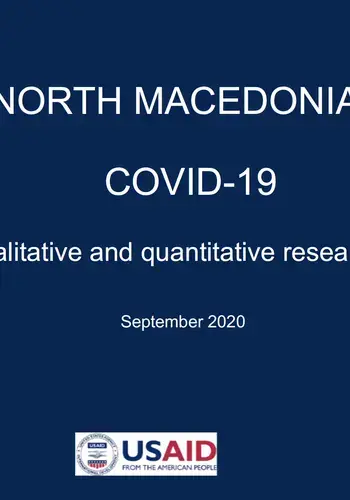NDI quantitative and qualitative public opinion research conducted between July and September 2020 in North Macedonia revealed that citizens are primarily concerned with their and their families’ health and safety, followed by wariness about the pandemic’s impact on the economy, and frustration over Covid-19 testing, along with primary and secondary education.
Respondents noted they were fully aware about protective measures such as facial coverings and physical distancing, but perceived that many citizens were not following these measures. While some citizens initially felt that “authoritarian tactics” may have worked better to address the pandemic, that percentage fell from 46 percent in July to 25 percent in September.
“It is hardly surprising that personal health concerns, followed by the economy and education, were foremost on the minds of citizens,” explained Robert Scott Heaslet, NDI North Macedonia Country Director, “they expected collaboration and consensus to safeguard public health during the COVID-19 crisis.”
Under a state of emergency from March to June 23, 2020, the then-interim government instituted curfews, quarantines, and remote education. Respondents felt that their social lives had not completely disappeared, with an average score of 3.1 July and August, and 3.2 in September (out of five points, with one being “improved greatly” and five - “worsened greatly”). They also noted positive aspects in spending more time with family or on household tasks.
Remote primary and secondary education was deemed unsatisfactory. Students needed a more structured pedagogy, internet access and other tools to help them persevere and succeed. As schools resumed in September, 64 percent of respondents did not believe that the Ministry of Education would be ready to start the new school year with hybrid or online-only models.
Findings showed great support for the medical professionals dealing with the COVID-19 pandemic, noting that they were true heroes in need of more government support. The survey data also revealed a strong majority were dissatisfied with the bureaucratic complexity, affordability, and equal access to Covid-19 testing.
Citizens were wary of the pandemic’s effects on the economy, with 61 percent of respondents surveyed in September believing that the crisis will continue through 2021. Between the July and September surveys, there was a 6.8 percent decrease in the number of respondents that claimed their jobs were affected by the pandemic (61.3 percent in July to 54.5 percent in September).
Most focus group participants were familiar with the economic measures enacted by the government, such as national payment cards, to unemployed and other vulnerable groups, but did not have much information about measures for companies and large businesses. Furthermore, they felt that government measures were widely misused.
Research revealed general approval of the measures declared by the interim technical government during the lockdown. However, citizens were largely dissatisfied with the performance of political institutions, ranking their performance at 2.7 in July and 2.8 in September (out of five points, with five being “most satisfied”). The Ministry of Health, the Army, the Police, as well as the President of the Republic performed better than other institutions.
Focus group participants perceived government inconsistency based on ethnic/religious grounds. They were frustrated with the actions of religious institutions, such as churches and mosques, that held services despite the lockdown.
A female Macedonian respondent from Skopje noted that, “The impact from the actions of the Church and the Islamic community was in fact the worst. [Religious leaders] organized liturgy processions in Struga, Bajram iftar dinners. They called their believers to come to churches and mosques. In one way or another, I think they actually were the biggest problem”.
Notably, focus group participants in Skopje, Shtip and Tetovo, both ethnic Macedonian and ethnic Albanian, stressed consultative governance in dealing with the COVID-19 pandemic.
In terms of international aid to combat the epidemic, the European Union (64.4 percent average between July and September), the World Health Organization (63.1 percent average), and China (58.5 percent average) were seen to have provided the most assistance to North Macedonia.
NDI conducted three rounds of quantitative research, monthly in July, August, and September with a representative sample of 800 respondents in each round Data was collected through computer-assisted telephone interviewing (CATI) with land and mobile phones in North Macedonia. The public opinion research has a margin of error of +/- 3.8 percent, with a confidence level of 95%. NDI conducted qualitative research in August through six online focus groups with ethnic Macedonian citizens in Skopje and Shtip, and ethnic Albanians in Tetovo.
The quantitative and qualitative research was developed by NDI, fielded by Ipsos, and supported by the United States Agency for International Development.

